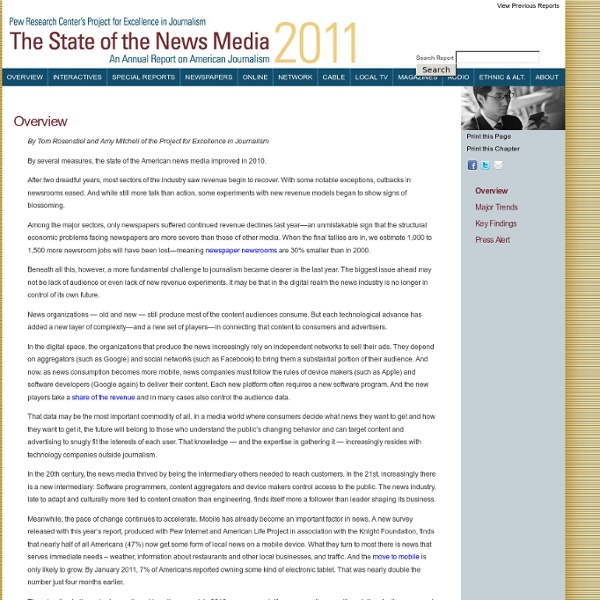As Many U.S. Newspapers Retrench from Online Video, New Opportunities Should Not Be Missed, The AP's Kevin Roach
WASHINGTON – Touted just three or four years ago as a promising editorial and business opportunity for newspapers to compete with local television stations and to grab new visitors and revenue streams, a large number of newspapers are cutting back on video and laying off video journalists, according to a study of 100 U.S. newspapers undertaken by the Associated Press. The internal study was directed by Kevin Roach, Director of U.S. Broadcast News. In this video interview, Roach says that many papers are cutting back primarily for financial reasons. As papers have been impacted by the economic downturn and business fundamentals, it has been the video operations which have been among the first to be cut. Social Media and Devices Offering New Opportunities Roach says that video should remain part of the editorial mix at newspapers. For video to be effective, he suggests papers publish breaking news of local interest and get it up quickly. Not all papers are cutting back. Andy Plesser
Exposés et documents à télécharger | GIJC 2010
Retrouvez ici certaines des présentations, textes et Powerpoints des speakers de la 6ème conférence des journalistes d'investigation. Ils sont en libre téléchargement. Comment organiser un desk d'investigation Téléchargez la présentation de la journaliste indonésienne Hermien Y. CAR: Data -driven journalism: Can digging into data help to finance investigative journalism? Présentation de Mirko Lorenz (European Journalism Centre - ECJ) Investigation en sport: le scandale des jeux olympiques Rainer Fleckl et Erich Vogl (Der Kurier, Autriche) ont révélé comment des sociétés de conseil auraient touché de l'argent de la ville de Salzbourg pour influer des votes en faveur de la candidature aux jeux de cette ville. La vérité sur les paradis fiscaux Santiago Fascetto (La Prensa, Panama) résume son enquête sur les fonds de l'ex président de Panama Enesto Pérez Balladares. Présentation en anglais Présentation en espagnol Enquêter sur le taser Dénoncer la cruauté envers les animaux grâce à une caméra cachée
REGARDS SUR LE NUMERIQUE: Blog - Le journalisme web sous toutes ses formes se taille la part du lion au prix Pulitzer RSLNmag est édité par Microsoft et se consacre à l’analyse et au décryptage du monde numérique..
Souvenez-vous. En avril 2010, nous nous étions longuement arrêtés sur le palmarès du prix Pulitzer, et, plus particulièrement sa composante « nouveaux formats, nouveaux supports » : sur les quatorze prix ès journalisme décernés en 2010, cinq s’accompagnaient en effet de motivations saluant une qualité particulièrement remarquable dans le traitement de l’info en ligne. Le palmarès 2011, qui a été révélé ce lundi 18 avril, s’inscrit résolument dans la même veine, et décerne encore une fois cinq récompenses à des productions faisant l’objet d’un traitement web innovant et particulier – et ne vous arrêtez surtout pas à la lecture qu’en fait l’AFP, qui affirme un peu rapidement que « les sites d'informations en ligne sont absents à l'exception de ProPublica, dont deux reporters […] sont récompensés dans la catégorie "reportage national". » Nous avons donc fouillé les mentions en toutes lettres du « web » dans les motivations des jurys. 1. Paige St. 2. 3. Ou bien encore … : 4. > Et sur RSLN :
Paywall Strategies 2012 preview: What have we learned about monetisation in a year?
At Paywall Strategies 2011, the first major conference from TheMediaBriefing, 12 months ago exactly, the assembled executives, MDs, founders and strategists were there to ask some searching questions about whether their titles should be charging for content. Now as we prepare for this year's conference on Thursday, I look back at some of the key trends and milestones in the online content revenue story. But first here's a recap of last year's event: Last year, that persistant phrase - that "no one will pay for stuff online" - was still alive and kicking. In conversations I had with some delegates, it was clear that theie starting point was one of defence: figuring out how much to invest in paid-for digital products and how much to protect print or advertising income from free-to-air sites. But now we're close to seeing every media business charge for something online, or at least put in place to steps to do so in future.



